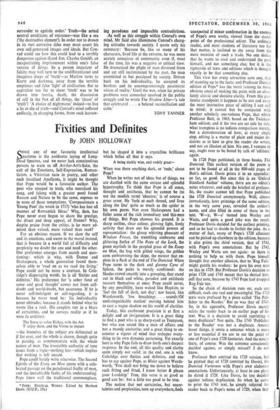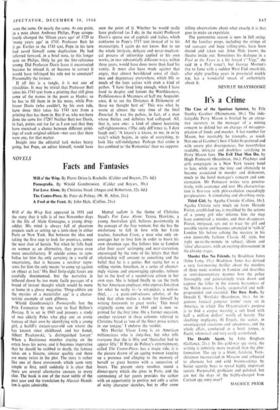Fixities and Definites
By JOHN HOLLOWAY
INCE one of our favourite intellectual opastimes is the assiduous laying of Long- Dead Spectres, and we never lack conscientious persons to warn us off Art-for-Art's-Sake, the cult of the Emotions, Self-Expression, Roman- ticism, a Victorian taste in poetry, and other such fossilised Apollyons, it might be thought that Pope would be a favourite author. The poet who stooped to truth, who moralised his song, and (along with a greater poet) found Reason and Nature to be the same, exposes us to none of those temptations. 'Compassionate a Young Poet' (he wrote in 1717) 'who has lost all manner of Romantick Ideas.' Why, then, has Pope never even begun to share the prestige, the direct and deep appeal, of Donne? Why, despite praise from the critics, is he more ad- mired than valued, more valued than read?
For an obvious reason. If we shun the self and its emotions, and warm to the moral instead, that is because in a world full of difficulty and perplexity we doubt the one and need the other. Our preference emerges from search and ques- tioning: which is why, with Donne and Shakespeare, a whole generation found them- selves able to 'read on as we read the living.' Pope could not be more a contrast. In Cole- ridge's disparaging words, he is all 'fixities and definites.' His preference for 'a sober fund of sense and good thought' comes not from self- doubt and world-doubt, but assurance. If he is never self-indulgent or self-regarding, it is because he never need be: his individuality never obtrudes, because it stands behind what he wrote like a rock. His couplets run in a blaze of certainties, and he surveys reality as if he were its architect.
The Sense to value Riches, with the Art r enjoy them, and the Virtue to impart —the branches of the subject are delineated as if for ever, and the whole is shown, though quite in passing, as commensurate with the whole nature of man. The irresistible authority of tone issues from a logic—nothing less—which implies that nothing is left unsaid.
Pope could barely write otherwise. The Second Epistle of the Essay on Man opens with a cele- brated passage on the paradoxical frailty of man, and the ineradicable faults of his understanding. Pope knew well the traditional commonplace, • Pon: POETICAL WORKS. Edited by Herbert Davis. (O.U.P., 35s.)
but he shaped it into a crystalline brilliance which belies all that it says.
A being darkly wise, and rudely great—
When was there anything dark, or 'rude,' about Pope?
When he writes not of ideas but of things, we are dazzled with the same unique and splendid hypertrophy. To think that Pope is all sense, thought and antithesis, that he cannot be (to use the modish term) `chosiste,' is of course a gross error. He 'feels at each thread, and lives along the line' quite as much as the spider in his own poem. Not even Shakespeare had a fuller sense of the rich immediacy and this-ness of things. But Pope chooses his ground. It is sharp outline, clear colour, glowing light, lively activity that draw out his splendid powers of representation: the glossy whirring pheasant of Windsor Forest, the trembling sunbeams and glittering forfex of The Rape of the Lock, the green myriads in the peopled grass of the Essay on Man, the bug with gilded wings, the golden corn embrowning the slope, the meteor that ex- pires in a flash at the end of The Dunciad. When Pope turns to the dark and gloomy Cave of Spleen, the point is merely confirmed: the Shades crowd smartly into a grouping, they stand out in black and white, paradox and antithesis reassert themselves at once. Pope could never, by any possibility, have waked like Hopkins to `feel the fell of dark, not day'; nor heard, like Wordsworth, low breathings . . . sounds/Of undistinguishable motion' moving behind him to cast a vague shadow on his world of clarities.
Today, this exuberant precision is at first a delight and an invigoration. It is a great thing to find a poet who is as sharp-eyed as Tennyson, but who can sound like a man of affairs and not a moody anchorite; and a great thing to en- counter a vigour of mind that reshapes every- thing to its own dynamic patterning. Yet exactly here is why Pope fails to draw forth one's deepest response. In the end, all this quality and clarity seem simply not valid; in the end, one is with Coleridge over fixities and definites, and one has to say against Pope, as Blake against Words- worth, 'You shall not bring me down to believe such fitting and fitted, I know better & please your Lordship.' True, this verse is as good as good can be: but a little too good to be true.
The notion that not certainties, but uncer- tainties and perplexities, turn up everywhere, finds
unexpected if minor confirmation in the cosmos of Pope's own works, viewed from the stand- point of the professional editor. The ordinary reader, and most students of literature too for that matter, is inclined to shy away from the mere mention of such a trade. No one denies that he wants to read and understand the poet himself, and not something else; but it is the rigmarole of texts and editions which is thought exactly to be that something else.
This view has every attraction save one, that of standing up to the facts; and Professor Davis's edition of Pope* has the merit (among its more obvious ones) of making the point with an abso- lutely cla-ssic and decisive clarity. From this par- ticular standpoint it happens to be out and away the most instructive piece of editing I can call to mind: it cannot but be compared with another scholarly one-volume Pope, that which Professor Butt, in 1963, based on the Twicken- ham edition; and if the two are set side by side, what transpires is no tedious comparison merely, but a demonstration of how, at every single step, editing is a matter of plain and major de- cisions as to how to give the reader the writer, and not an illusion of him. No one, I venture to say, ought ever to be bored by talk of 'editions' again.
In 1728 Pope published, in three books, The Dunciad. This earliest version of the poem is not to be found at all in the 800-odd pages of Butt's edition. Davis prints it in an appendix: so far, so good. But since this is an 'Oxford Standard Author' volume, there are no editor's notes whatever, and only the briefest of prefaces. So, the reader cannot tell that Pope published the 1728 Dunciad anonymously. Well, almost immediately, later printings of the same edition, in the very same year, revealed the author's name, and also filled in some of those in the text. 'W---y, W---s' turned into Wesley and Watts, and quite a good joke was the result. Professor Davis decided for the earliest printing, and so he had to decide to forfeit the joke. As a matter of fact, many of Pope's 1728 allusions can be picked up elsewhere in the edition, because it also prints the third version, that of 1743, with Pope's own annotations. But by 1743, Wesley and Watts are out again: so there is nothing to help us with them. Pope himself thought that another allusion, that to 'Rag Fair,' might puzzle his readers: he gave his own note on this in 1729. But Professor Davis's decision to print 1728 and 1743 meant that he denied him- self that note, because by 1743 Pope had dropped Rag Fair too.
So the chain of decision runs on; each one difficult, each one real and meaningful. The 1728 texts were prefaced by a piece called 'The Pub- lisher to the Reader.' But so was that of 1743. So, in his appendix, Professor Davis merely refers the reader back to an earlier page of his text. Was it a decision to avoid reprinting a mere duplicate? Not quite. The 1743 'Publisher to the Reader' was not a duplicate. Among lesser things, it omits a sentence which is more or less essential if we are to see the point of one of Pope's own 1728 footnotes. And the note is there, of course. Was the sentence consciously decided against, or simply missed? I do not know.
Professor Butt omitted the 1728 version, but he printed that of 1729 (omitted by Davis), the Dunciad Variorum with Pope's own elaborate annotations. Unfortunately, at least in one place he dated it 1728. Like Davis, he too decide) against tedious duplication. So when he cam. to print the 1743 text, he simply referred the reader back to Pope's notes of 1729, when they
were the same. Or nearly the same. At one point, in a note about Ambrose Philips, Pope scrupu- lously changed the `fifteen years ago' of 1729 to `many years ago' in 1743. Professor Butt let it go. Earlier in the 1743 text, Pope in his turn had saved himself some duplication. He had referred forward, in a brief note, to this longer note on Philips. Only he got the line-reference wrong. Did Professor Davis leave it uncorrected because he missed it, or because to correct it would have infringed his rule not to annotate? Presumably the former.
If all this is a tangle, it is not one of trivialities. It may be trivial that Professor Butt takes his 1743 text from a printing that still gives some of the names in the poem as blanks; so he has to fill them in in his notes, while Pro- fessor Davis (who couldn't, by his own rule, have done this) takes his 1743 text from a printing that has them in. But if so, why not have done the same for 1728? Neither Butt nor Davis, in fact, points out (so far as I can see) that they have exercised a choice between different print- ings of each original edition—nor says that there were any, for that matter.
Insight into the editorial task makes heavy going, but Pope, an editor himself, would have
seen the point of it. Whether he would really have preferred (as I do, in the main) Professor Davis's sparse use of capitals and italics, which conforms to Pope's 1717 text instead of to his manuscripts, I again do not know. But to see the whole intricate, delicate and never-mechani- cal process of editorship applied to his own works, in two substantially different ways, within three years, would have done more than feed his vanity. It must also have made against that angry, that almost bewildered sense of slack- ness and degeneracy everywhere, which fills so much of the later satires with even a kind of pathos. 'I have lived long enough, when I have lived to despise and lament the Worthlessness, Perfidiousness & Meanness of half my Acquaint- ance, & to see the Dirtyness & Dishonesty of those we thought best of.' This was what he wrote at almost the very time of the final Dunciad. It was the pathos, in fact, of a man whose fixities and definites had collapsed. All, that is, save one: a kind of almost hectoring self-righteousness (`The only diff'rence is, I dare laugh out'; `A knave's a knave, to me, in ev'ry state') which begins, in spite of everything, to look like self-indulgence. Perhaps that crime is less confined to `the Romantics' than we suppose.







































 Previous page
Previous page